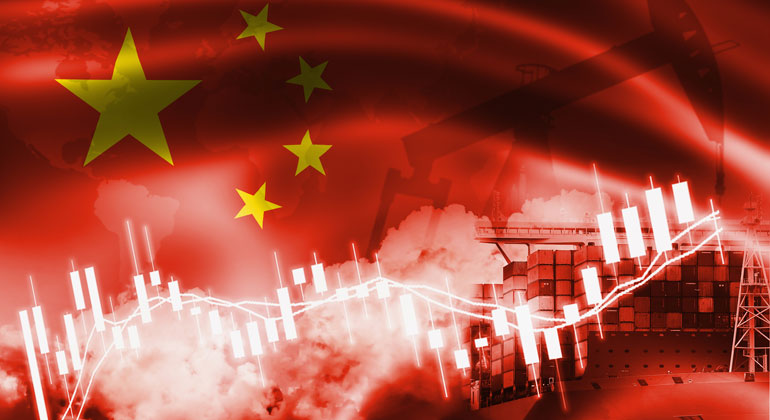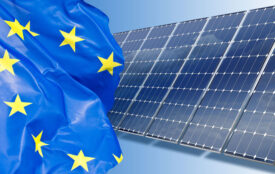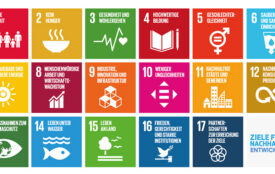The world at an energy policy crossroads
The European Union must choose between the poles of the USA and China – or pursue its own model
The success of renewable energies
Renewable energies are on the rise worldwide. Forward-looking, groundbreaking legislation has enabled the technology to develop rapidly, so that its technical performance is no longer in question. Wind and solar energy in particular are available in abundance practically everywhere and are now the cheapest sources of electricity by far. Storage technology has also developed fast in recent years, meaning that batteries will ensure that enough electricity is available even in periods of low wind and low sunshine. This is of course even more true in combination with other renewable energies such as biomass, hydropower or geothermal energy, which can also be stored seasonally.
Despite, or perhaps because of, its success, the triumphant advance of renewable energies now stands at a crossroads. The old fossil fuel companies and also the countries whose revenues are primarily based on fossil fuels have long been trying to disrupt the advance of renewable energies. For years, they succeeded in doing so by pointing to alleged technical immaturity or by claiming that renewable energies were too expensive. With framework conditions that discriminate against renewable energies, it was possible to delay their success.
Today, however, the economic, ecological and social advantages of renewable energies can no longer be ignored – if rational arguments and actions are used. Above all, the success of right-wing populist movements has meant that rational arguments now play only a limited role in political debate. The buzzword ‘alternative facts’ describes how public debate is conducted today, even beyond energy policy. Many people are deliberately misled with false facts, often even with deliberate lies, and allow themselves to be misled, further fuelled by the algorithms of social media such as X or Facebook.
Ultimately, this misleading information can only be effectively countered if people directly and immediately feel the benefits of renewable energies and know from their own experience that fossil fuel propaganda is false. Even scientifically sound treatises or moral references to the long-term consequences of climate change do not resonate sufficiently with many people and, above all, do not lead to the necessary behavioural change.
A turning point thanks to Donald Trump
Donald Trump’s re-election as President of the United States is undoubtedly a turning point in global energy policy. Trump is not only the originator of the concept of alternative facts, so to speak, but he has also explicitly placed his presidency under the motto ‘Drill, baby, drill’ – which ultimately means the revival of an industry in decline. This comes as no surprise, as he is acting in the interests of the fossil fuel companies that enabled his re-election through their massive support. With Donald Trump, renewable energies in the United States have come under more pressure than ever since Ronald Reagan discontinued numerous programmes initiated by his predecessor Jimmy Carter. Trump is reversing almost all of his predecessor’s groundbreaking achievements, most notably the Inflation Reduction Act, which was set to put the US in a leading role in global energy policy. Trump wants to prevent the success of renewable energies and the decline of the fossil fuel industry by any means necessary, even if this course of action has many economic disadvantages for the US. Unlike Reagan, market-liberal ideology no longer plays a role for Trump. If there is no other way to stop renewable energies, Trump simply resorts to regulatory law, which is frowned upon by market liberals – his government simply bans wind farms.
Other countries such as Russia and Saudi Arabia are among the traditional opponents of the energy transformation, but their global influence is not as strong as that of the United States. With Trump’s re-election, the US has now taken on a key role in the fossil fuel backlash within a very short time and today represents, at least at the federal level, the paradigm of the fossil fuel state. Of course, it is to be hoped that the people of the US will resist this shift. The states in particular will have a very important role to play in this regard in the coming years.
China’s emerging role
While the US government is currently halting almost all renewable energy support programmes, thereby setting back the country’s industrial development, China made the fundamental decision more than 20 years ago to primarily supply itself with renewable energy. This became apparent to the world with the rapid development and rise of the Chinese solar industry, which now dominates the global markets. In the wind energy sector, too, the turbines installed in China now account for more than three-quarters of the global market volume, and Chinese companies are also at the forefront of global technology. China is also focusing on hydropower, battery storage, electric cars, smart grids and so on. The country is thus purposefully transforming itself into an economy based almost entirely on renewable energies. As the country still uses a lot of coal for electricity, many overlook the momentum that the expansion of renewable energies in China has now achieved.
China is not only tackling many environmental problems, but is also using this to open up new export markets. China understands that many other countries will follow suit for economic reasons alone. However, as China is also fulfilling its climate policy commitments, while the US has just withdrawn from the Paris Climate Agreement, the country is perceived by large parts of the international community as being in an increasingly better moral position.
Europe in the new bipolar world
Within a short period of time, the world’s two largest economies have developed into two opposing poles: the regressive, fossil fuel-dependent United States and the innovative China, which is building on renewable energies.
Although many renewable energy technologies originated in Europe and many countries, especially Germany, played a pioneering role, the European Union has been veering from one energy policy to another for some time now. The continent has already lost key industries such as the solar industry to China, yet it still classifies nuclear power and natural gas as sustainable. At the same time, there are still ambitious goals and programmes in place to lead Europe into a renewable future. Recently, however, there has been a rise in right-wing populist forces that prefer to align themselves with Trump and want to reverse the progress of the European energy transformation, including the Green Deal. At the same time, many European countries have already achieved a very high share of renewable energies and want to continue on this path.
Europe, the world’s largest economic area, must therefore choose between two poles: does it want to follow the US in reversing its fossil fuel policy, increasing its dependence on fossil fuel suppliers and abandoning the fight against the climate crisis, or does it want to rely on its domestic innovative strength and, like China, massively expand renewable energies?
The third way: decentralised and participatory renewable energy industry
However, Europeans are not limited to choosing between the two models of fossil fuels or renewables. Instead, Europe could develop a third model: an economy that, like China, is primarily powered by renewable energies, but which at the same time remains decentralised, democratic and subsidiarily structured. The decentralised nature of renewable energies argues in favour of such an approach, as renewable energies can be used much more efficiently in a decentralised manner and because this allows people across the board to benefit from the use of renewable energies. A European energy industry that consistently relies on decentralised supply structures, uses cellular networks, supports energy sharing and community energy, and in which people themselves increasingly become owners of energy production, or prosumers, can give European integration a decisive degree of additional legitimacy and ultimately ensure Europe’s long-term success.
The coming months and years will show whether Europe has enough strength and whether the continent is united enough to independently develop and implement this model of decentralised renewable energy. It holds enormous economic, ecological, social and democratic potential for all countries on the continent.
Even if right-wing populist and authoritarian forces in Europe currently appear to be gaining strength, in principle the continent and its people are strong enough to pursue this democratic path, and the subsidiary structure of the European Union is also in line with this paradigm – even if the aforementioned forces are increasingly attempting to challenge it.
The great global appeal of a successful Europe should not be underestimated. If Europe develops and consistently pursues a model that benefits the people of Europe, that focuses on domestic renewable energies with decentralised structures, then this model can have a similar appeal to that of the Federal Republic of Germany during the Cold War on the people of the GDR or the European Community on the people of the Warsaw Pact states.
Germany in Europe
Germany was one of the first countries in the world to pave the way for wind and solar energy in particular and enable their industrial breakthrough, primarily with the Renewable Energy Sources Act, which was passed 25 years ago. Unfortunately, Germany recklessly squandered its technological lead in the years that followed by repeatedly making deep cuts in the promotion of renewable energies. As a result, the once leading PV industry has completely migrated to China, and the country is no longer a major player in areas such as battery technology.
Although the previous coalition government improved some framework conditions, it failed to unleash the decentralised energy transformation and completely free itself from fossil fuel dependency. In contrast, the current coalition agreement provides for some improvements, for example in the areas of energy sharing, battery technology and biogas, but the statements made by the Minister for Economic Affairs counteract these goals, which is cause for concern. Germany is thus in danger of losing its industrial edge and thus also its international competitiveness due to right-wing populist arguments. This would also have a significant impact on Europe’s role in an increasingly bipolar energy world. However, there is reason to hope that the critical mass of the community energy movement in Germany is now strong enough to prevent a relapse into the fossil fuel era, thanks in part to cross-party alliances.
Europe and China
The question remains as to how Europe’s relationship with the US and China will develop under such geo-energy policy conditions. The situation in the US is currently unpredictable, and Europe would do well to prepare itself for unstable relations with its formerly most important ally. In any case, the importance of the US as Europe’s most important export market will decline – which could be more than offset by savings in European fossil fuel imports and a stronger focus on the domestic renewable energy industry. The tide may turn again in the US in the coming years, in which case Europe should of course stand by the US and support the people of the US.
In the interests of the global community, Europe should seek constructive cooperation with China on energy policy. Even though the two regions are developing very differently in socio-political terms, cooperation in the field of energy and climate policy offers enormous opportunities for the whole world. Europe and China can play a key role in the global energy transformation and in the global fight against climate change by using their resources for this purpose. This naturally requires constructive dialogue on an equal footing, in which both blocs formulate their own and shared interests and develop their relations on a clear basis. This also means that Europe and China can and should work together to convince numerous other countries that the path of renewable energies is the path to a good future for all people, a prosperous and more peaceful world that successfully overcomes the climate crisis.
Source
Stefan Gsänger 2025 | Generalsekretär der World Wind Energy Association WWEA, Co-Chair der Global 100% Renewable Energy Platform










